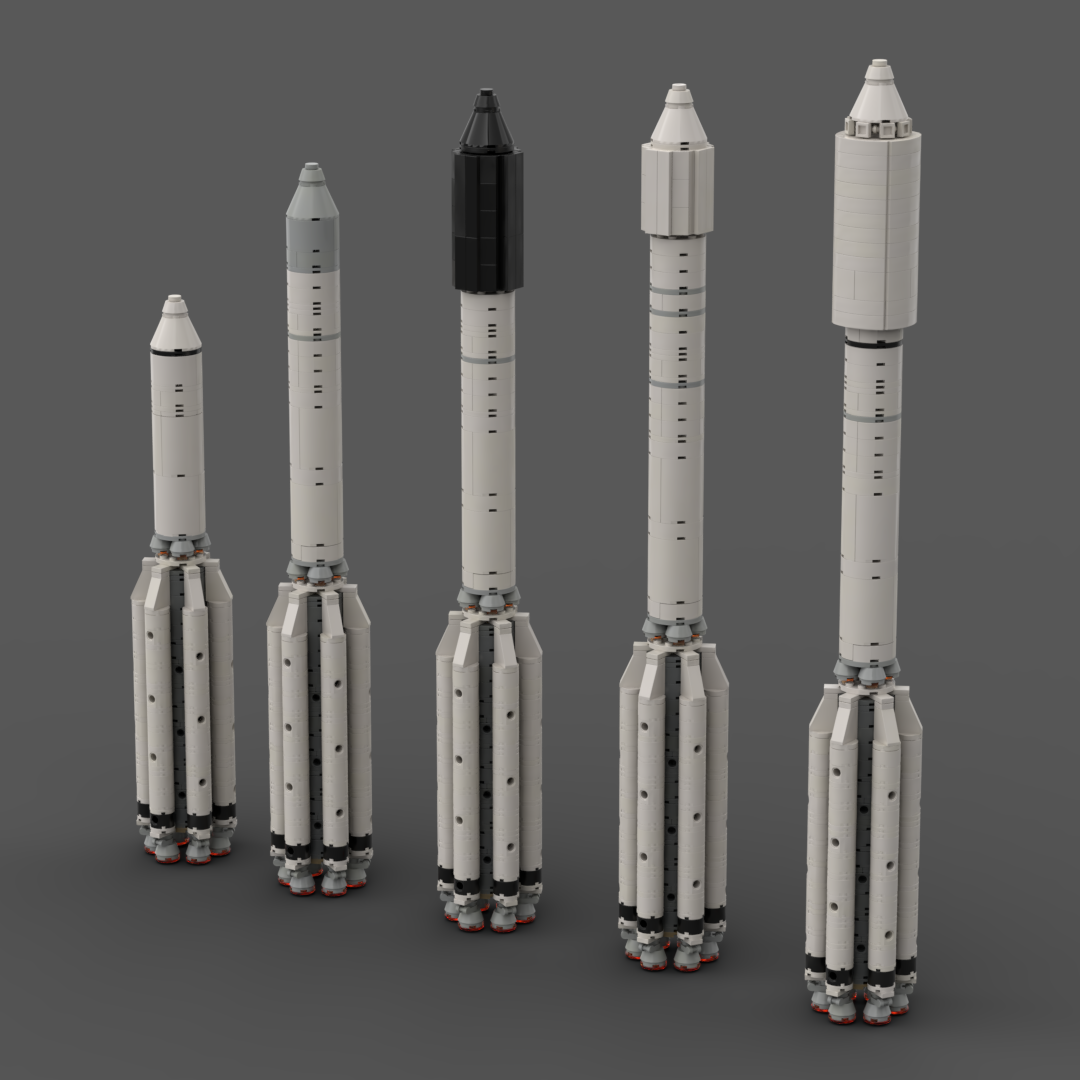
LEGO Designer:
Damian Bailey (DamoB)
Designed:
January 2020
Categories:
Launch Vehicles, All, Heavy Lift Launch Vehicles, Space Agency - Roscosmos
The Proton was originally conceived as an intercontinental ballistic missile that was called the UR-500, but its purpose changed to launching space payloads during development. The first launch took place in July 1965 and since then, the rocket has achieved a more than 90 percent reliability rate.
A Proton-K was used for the Zond 5 mission which successfully carried tortoises and other creatures around the moon in September 1968, just months before the first humans orbited the moon during Apollo 8. Proton-K rockets also launched several Luna missions. Notable examples are the Luna 16 and Luna 17 missions in 1970. These 1970 missions included two landers and a rover that for decades, held a long-distance travel record for off-world exploration.
Proton-K rockets launched both the Mars 2 and Mars 3 missions in 1971, both arrived safely at the Red Planet and achieved most major objectives. More recently, however, the Mars 96 mission failed during a Proton launch in November 1996.
In the mid-1970s, the Proton-K variant successfully carried several Venus missions into space. This included Venera’s 9 and 10, whose lander components arrived safely on the surface in 1975, and Venera’s 13 and 14, whose landers touched down in 1981. A Proton-K rocket also launched the core module of the Soviet Union’s Mir space station in 1986.
The Proton rocket line expanded to commercial business in the 1990s, with its first contract for the Inmarsat communications satellite in 1993; its first commercial payload was launched in 1996. Proton also assisted in the construction of the International Space Station by launching the Zarya and Zvezda modules in 1998 and 2000, respectively (Proton-K Zarya).
In its Briz-M launch configuration, the Proton has a restartable upper stage and works with all major commercial spacecraft platforms, according to International Launch Services. ILS markets commercial Proton launches as a joint venture between Khrunichev and the Russian firm RSC Energia.
Since 2010, Protons have launched dozens of communications and navigation satellites, with a few failures along the way – mainly in Briz-M upper stages. In August 2012, during the Telkom 3 mission, the Briz-M upper stage failed. More problems with a Briz-M caused a partial failure of a December 2012 mission, although the satellite was able to move into its intended orbit. Other Briz-M failures occurred during missions in May 2014 and May 2015.
A Proton-M launching several navigation satellites crashed near the launch pad on July 2, 2013, which marked the only first-stage failure in the past 30 years. The cause was linked to a rate gyro package being installed upside-down.
A Proton rocket successfully sent the ExoMars Trace Gas Orbiter (along with the Schiaparelli test lander) into space on March 14, 2016. The TGO reached Mars safely and successfully began its mission, but Schiaparelli failed during landing.
Designer Notes
After a few attempts to complete my Proton collection I’m declaring myself done… for now.
These instructions will allow you to build any Proton rocket from the original UR-500 which flew in 1965 up to the latest Proton-M Ph.IV Breeze-M which debuted in 2016. The Proton has a 55 year history and has been the Russian heavy lift workhorse alongside its better known Soyuz counterpart throughout that time – I hope that these instructions will help you to add it to your 1:110 collection.
UR-500
Part count: 324 bricks, 38 lots.
| Unit | width | length | height |
|---|---|---|---|
| Studs | 7.9 | 8.0 | 45.6 |
| Centimetres | 6.3 | 6.4 | 36.5 |
| Inches | 2.5 | 2.5 | 14.4 |
Proton-K
Part count: 353 bricks, 40 lots.
| Unit | width | length | height |
|---|---|---|---|
| Studs | 7.9 | 8.0 | 57.2 |
| Centimetres | 6.3 | 6.4 | 45.8 |
| Inches | 2.5 | 2.5 | 18.0 |
Proton-K Zarya
Part count: 413 bricks, 52 lots.
| Unit | width | length | height |
|---|---|---|---|
| Studs | 7.9 | 8.0 | 64.0 |
| Centimetres | 6.3 | 6.4 | 51.2 |
| Inches | 2.5 | 2.5 | 20.2 |
Proton Blok DM
Part count: 400 bricks, 50 lots.
| Unit | width | length | height |
|---|---|---|---|
| Studs | 7.9 | 8.0 | 65.6 |
| Centimetres | 6.3 | 6.4 | 52.5 |
| Inches | 2.5 | 2.5 | 20.7 |
Proton Breeze-M
Part count: 464 bricks, 58 lots.
| Unit | width | length | height |
|---|---|---|---|
| Studs | 7.9 | 8.0 | 68.8 |
| Centimetres | 6.3 | 6.4 | 55.1 |
| Inches | 2.5 | 2.5 | 21.7 |
Downloads
Part count: bricks, lots.
| Unit | width | length | height |
|---|---|---|---|
| Studs | |||
| Inches | |||
| Centimetres |
No external URL provided.
Launch History information from space.skyrocket.de
Launch History information from space.skyrocket.de
Related Posts
None found

